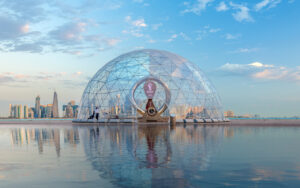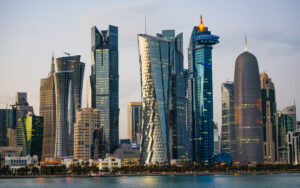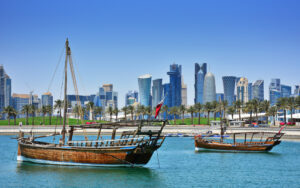Soon, all the word will have eyes on Qatar, the host country for the 2022 World Cup to be held from November 20 to December 18. The competition – which will attract thousands of sports fans to the Middle East, the region in which Qatar is located – will be an opportunity to promote the country’s growing tourism industry.

This will be the first time the World Cup will be held in the Middle East, an important Asian region in the world’s history and geopolitics. It was only in 1971 that Qatar gained its independence. Before that, the country was a British protectorate, meaning there was military protection from the United Kingdom.
Located on a peninsula, Qatar is bordered by Saudi Arabia to the south, and the Persian Gulf that surrounds the rest of the country. With only 11,437 km², its territory is the 159th on the list of largest countries.
The capital Doha is located on the coast and its architecture is characterized by state-of-the-art skyscrapers, a true contrast between nature and modernity. An interesting detail is that, although the country has about 2.7 million inhabitants, it is estimated that about 85% are immigrants, mainly Indians. Only 300 thousand people are actually citizens who were born in the country.

Desert and hot
Since the country is a desert, it is easy to know its temperature: extremely hot! This means that in summer, the thermometers easily reach 50°C. This is one of the reasons why the 2022 World Cup will only take place in November and December: to run away from the extreme temperatures.
The World Cup stadiums will have air conditioning to avoid high temperatures, even in the Qatari fall. All, built and renovated, stadiums have high technology to provide adequate cooling for fans, players, journalists and staff during World Cup matches. With this, the air conditioning will be programmed to maintain a constant temperature of 26°C. This technology uses 40 % less energy than conventional cooling systems and will be used to ventilate the entire interior of the place.
Local culture
Islam is the official religion, which makes tourists meet large mosques. This also influences the dress code of the locals. Visitors can wear western clothes, but it is not recommended to wear short, see-through, low-cut, or tight clothing to avoid offending the local religion. In mosques, women must wear headscarves around the head and shoulders, and everyone must wear loose clothing covering arms and legs.
Muslims are not allowed to consume alcohol, but it is free for tourists. Qatari cuisine is vast, with many typical dishes. It is worth tasting machbous (risotto with meat or seafood), haruf (roasted lamb rice), umm ali (bread pudding with nuts and raisins), and mehalabiya (flan with pistachios). Foreigners are allowed both to eat and to buy. However, the prices are not very attractive.
The Qatari economy
One of the points that draws attention about Qatar and that served to qualify the country to host the World Cup is the economy. With large reserves of oil and natural gas – the country has the third largest reserve in the world – Qatar became a financial power. In the bid for the 2022 World Cup, it overtook the United States in the final round of voting.

Qatar’s host cities for the 2022 World Cup
– Doha (capital)
– Lusaka
– Al Khor
– Al Rayyan
– Al Wakrah



